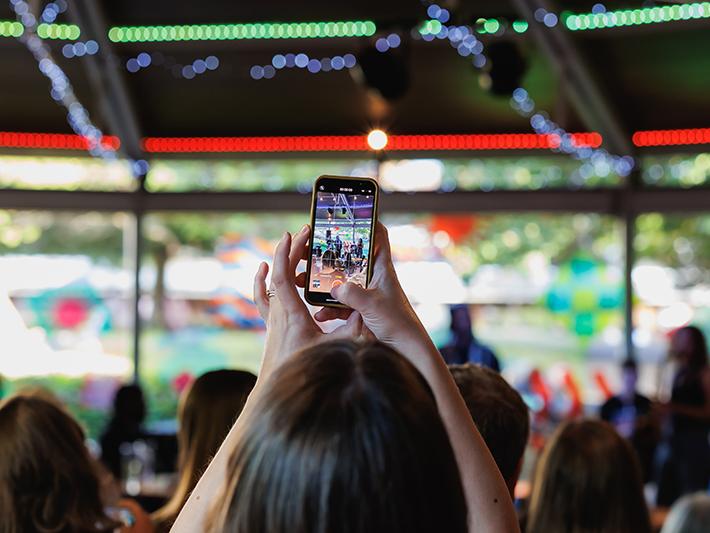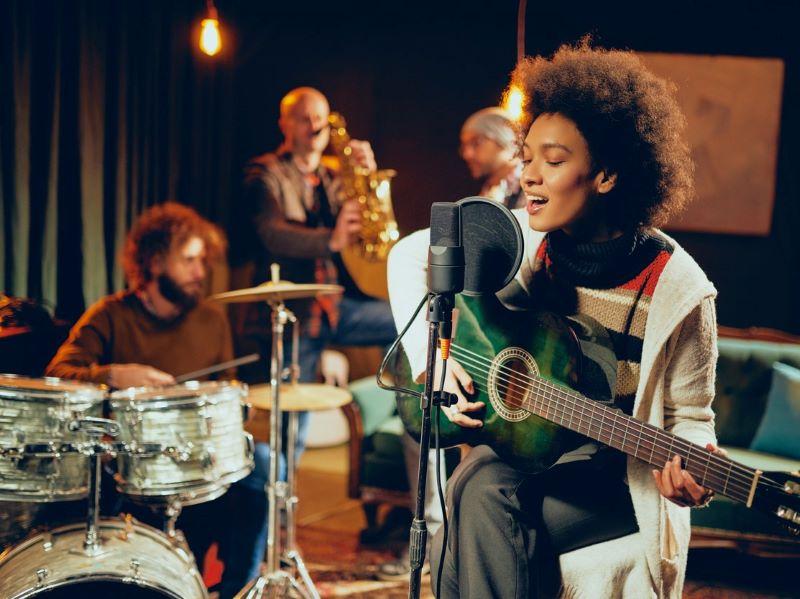
How civic arts programmes can make students feel welcome
Beginning university spells huge change for students. As well as the excitement of moving to a new city or pursuing an academic specialism, they often also leave friends or wider interests behind. So, connecting with their peers and local people through shared passions can help them retain and strengthen their sense of identity and belonging.
Here’s how we have used music to support students and help them feel at home.
We wanted to enable students and local young people to collaborate and gain new skills and experience, so we created an annual programme with a paid opportunity for music lovers aged 18 to 25 living in our city. The Vibe Collective welcomes younger audiences into Turner Sims, the university’s 50-year-old music venue, as programmers – and, by extension, as participants in our events.
- How Mozart and the arts can help students feel less awkward
- Resource collection: The power of place-based learning
- Make a difference: collaboration and participation in arts-led research
Successful applicants worked with us over six months to programme and produce the Vibe Lounge, a series of informal free events in the venue’s foyer. However, the programme had a wider-reaching impact than our initial aim, enhancing a sense of belonging in the university and the city’s cultural scene.
The opportunity: an international student’s perspective
Carley Divish came to Southampton from the US to study an MSc in maritime archaeology.
“I’d been involved in the underground music scene in my previous university city, Bloomington, Indiana. When I moved to Southampton, I frequented music venues, but they didn’t have the same sense of community. I thought the Vibe Collective at Turner Sims might fill that gap. As an MSc student from abroad, I was older than other students on campus and I didn’t have a community in place. The age diversity of the Vibe made me feel welcome and accepted.”
Key ingredients to foster belonging within and beyond civic arts programmes
1. Centre an open invitation around a shared interest
For the Vibe, we put out an open call through social media, website and flyers to all 18- to 25-year-olds living in Southampton with an interest in music. We aimed to recruit 50 per cent students and 50 per cent young people from the wider city population. Vibe members said the range of perspectives and lived experience in the group gave them a deeper understanding of diversity and inclusion, and made them feel welcome to be themselves.
2. Create shared values
The Vibe Collective met regularly, with sessions spanning creative workshops, planning meetings and visits from guest speakers, which led to deciding upon the public events we wanted to present.
In the early sessions, we discussed key questions to identify:
- how the collective members wanted people to feel when attending a Vibe event
- who they wanted to attract
- how they would work together
- how they would add value to the group and what they would like to gain.
The group agreed they wanted people to feel welcome and included. They wanted to work collaboratively and vote on ideas, so everyone had equal opportunity to input suggestions. This meant the group worked in a respectful and collaborative way from the start. The group’s shared ethos meant individual perspectives were listened to and considered, resulting in inclusive events that made people feel safe and welcome to explore new music.
3. Set clear parameters
Nobody is better placed to create events for 18- to 25-year-olds than students and young people themselves. We wanted the Vibe Collective to have freedom and autonomy in terms of programming decisions, while working within a budget and understanding that a university venue comes with constraints. Setting clear parameters from the start meant we had to say no to fewer things later. We could be excited and supportive of members’ ideas, which helped retain trust and motivation.
4. Provide specialist guidance and support
Participants worked alongside practising arts professionals to curate and deliver events, from booking artists and arranging technical requirements to developing marketing content. We offered freedom to pursue ideas and a strong support network to help identify and address potential issues. This enabled the group to turn their ideas into successful events, which boosted their confidence and skills.
5. Understand and celebrate impact
We brought in an evaluation expert to help the collective implement evaluation techniques, including co-producing a theory of change to assess impact and capturing audience data and insights to help refine future events. The group found that:
- 98 per cent of attendees said they would attend a similar event in the future
- 98 per cent agreed they felt welcome and included
- 95 per cent said attending the event had a positive impact on their mental well-being
- 20 per cent had never visited the venue before.
The university’s Turner Sims team also celebrated the impact that Vibe events have had on the venue and its audiences. Members of the collective have been featured in local media coverage and played an active role in wider events, like the university council’s visit to Turner Sims and our 50th-anniversary reception
The Vibe impact: Carley’s student perspective
“Being part of a programme like The Vibe takes the pressure off you as a person and turns you into a collective. It’s not about your grades or performance; it’s about what you create together. Being part of a team feels good.
“Now I’m part of a new cohort of assistant producers at Turner Sims. We’re tasked with bringing new audiences, new music and overall excitement into the venue. We’re working towards opening up current audiences to wider genres of music, alongside inviting new communities in, and showcasing youth voices. Through working here I have learned about my own love of music, how to programme an event from idea to execution, and how to invite new audiences without alienating others.
“Belonging comes from the trust and confidence the Turner Sims team put in us. Trusting us to put on our own events and getting excited about them made us feel valued by the team and university. We have become part of the city’s cultural scene and created something that we hope will make other young people feel like they belong here.”
Jessica Santer is head of engagement and participation at Turner Sims, the music venue at University of Southampton.
Carley Divish is an MSc marine archaeology alumnus at the University of Southampton and assistant producer at Turner Sims.
If you would like advice and insight from academics and university staff delivered direct to your inbox each week, sign up for the Campus newsletter.
Additional Links
For more advice and insight on this topic, read our spotlight guide on how to build belonging at your institution.




